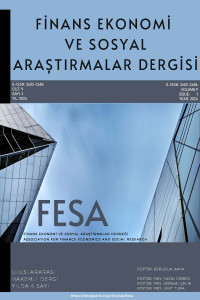Araştırma Makaleleri
Research Article
2. THE EFFECT OF WIND ENERGY ON CARBON EMISSIONSResearch Article
3. Küçük Ölçekli Mimarlık Ofisleri için Bilgi Yönetimi ModeliIssue Reviewers
 Web
Web



























Aim & Scope
The aim of the journal is to contribute to the social sciences literature in the international arena by including articles based on original studies in the fields of economy, banking, economics, finance, insurance, social sciences, and finance. In this context, the Journal of Finance, Economy, and Social Research is open to future research from all disciplines interested in the subject. In addition, the journal wishes to evaluate articles from researchers and practitioners as well as articles from academics.
Journal of Finance, Economics, and Social Studies (FESA) is an international peer-reviewed journal. Journal of Finance, Economics and Social Studies is a journal open to theoretical-analytical empirical research and analysis prepared in all sub-disciplines of economics, banking, economics, finance, insurance, social sciences, and finance.
Author Guidelines
Sample Article Template - Click to download : https://dergipark.org.tr/tr/download/journal-file/20506
Dear Author/Authors, please edit your article in accordance with the sample template and add it to the system.
Writing rules
On the first page, the abstract consisting of maximum 150 words, arranged in Turkish and English, should be written in 9 pt, titles in 10 pt, justified and bold.
The article title, keywords and gel codes should be stated in Turkish and English and should be placed at the top and bottom in 14 points.
There should be at least 3 JEL codes and 3 keywords.
The name of the author or authors should be written as a footnote with a "*" sign next to the author or authors' names, with a space left, right-justified, italicized and bold, with a space left, and the titles of the authors, the institutions they work, and the places where they can be reached. It should be written in 10 points with e-mail addresses.
Submitted works must not have been published anywhere before.
The font should be in the 10-point Times New Roman format. The text should be written single-spaced and justified.
Page layout should be “normal”, 2.5 cm from the top, 2.5 cm from the bottom, 2.5 cm on the right, 2.5 cm on the left, 1 cm indent.
The main headings of the article should be 14 pt, bold and all capital letters, subheadings should be 12 pt, bold and the first letters should be capitalized.
References should be written in 10 font size and should be placed at the end of the article right after the conclusion.
References should be made not in footnotes, but in parentheses to the relevant place in the (APA) text. The order in parentheses should be the surname of the author(s), year of the source, page number or numbers.
In the bibliography, the surnames of the author(s) should be written in capital letters, the first letter of the first letter should be capitalized and the following should be written in lowercase.
References in the bibliography should be listed alphabetically according to the surname of the author.
If there is no author's name in the internet resources, these resources should be listed in the "Internet Resources" heading according to the access dates after the list of specific sources in the bibliography ends.
For tables, figures, graphics and pictures, if cited, the source must be indicated. The source to be shown should be specified just below the table, figure, graphic and picture, in 10 points, with 1-line spacing.
The names of tables, figures, graphics and pictures should be written above the borders of tables, figures, graphics and pictures, Times New Roman, 10 points, bold, 1-spaced, and the initials of the words should be written in capital letters. 19. If it is necessary to make an evaluation on any form condition other than the directive, the authority to request corrections belongs to the Editorial Board.
For articles accepted for publication, at least one of the authors must sign the publishing rights agreement sent by the editor.
The editor and the editorial board can make the necessary changes (font size, writing style, page numbering, etc.)
The bibliography should be arranged in 10 points at the end of the study. The bibliography should start from the page after the text of the article and the studies should be listed alphabetically by surname. When citing multiple works by the same author, the publication date should start with the oldest. When citing more than one work of the same author with the same date, references should be numbered using the letters a, b, c, … in the bibliography and in-text citations. Example; Like 2010a, 2010b, 2010c. In case of reference to a single or multiple authored work of an author, single-authored works should be specified first. The standard APA 6 format should be used for writing the references. (Example: Surname, Initials. (Year), Title of Work, Place of Published: Press.)
Articles in the above features; CLICK to reach the Dergipark FESA page.
Manuscripts that do not contain the required features will not be considered.
More than one article with a single author belonging to the same author cannot be published in the same issue.
Our journal, which is published 4 issues a year in March-June-September-December; Article submission is welcome. Until each issue is published, our completed articles are queued and our unfinished articles are kept waiting for publication in the next issues.
For APA rules, you can visit the links below:
Basics of APA Style Tutorial; (http://flash1r.apa.org/apastyle/basics/index.htm)
APA Formatting and Style Guide; (https://owl.english.purdue.edu/owl/resource/560/01/)
Mini-Guide to APA 6th for Referencing, Citing, Quoting (http://library.manukau.ac.nz/pdfs/apa6thmini.pdf)
Ethical Principles and Publication Policy
Yayın Politikamız ve Etik Değerler
Dergimizin benimsemiş olduğu etik görev ve sorumluluklarda "Yükseköğretim Kurumları Bilimsel Araştırma ve Yayın Etiği Yönergesi" ve "Committee on Publication Ethics (COPE)" tarafından yayınlanan ilkeler dikkate alınmaktadır.
Dergimize sunulan çalışmalar; insandan anket, mülakat, odak grup çalışması, deney vb. yollarla veri toplanmasını ve deneysel ya da diğer bilimsel amaçlarla kullanılmasını öngörüyor ise başvuru öncesinde ilgili kurumun İnsan Araştırmaları Etik Kurulu’ndan Etik Kurul Onay Belgesi alınması zorunludur.
Derginin yayın politikasına ilişkin temel ilkeler şunlardır:
1. Dergide Türkçe ya da İngilizce olarak hazırlanmış çalışmalara yer verilecektir.
2. Türkçe hazırlanan yazıların İngilizce özetleri de eklenecektir.
3. Yazarlar tarafından dergiye gönderilecek yazılar başka hiçbir yerde yayınlanmamış olmalıdır.
4. Dergi yılda dört kez yayınlanacaktır. Editör ve ilgili kurullar gerekli gördüğü takdirde özel sayılar çıkarabilirler.
5. Derginin amacına uygun olarak, alanında uzman ve saygın akademisyenlerden oluşan bir danışma ve hakem kurulu oluşturulacaktır.
6. Derginin bilimsel işlemlerinin yürütülmesi editör tarafından üstlenilecektir. Editör yardımcıları, bu işlerin yürütülmesinde editöre yardımcı olacaktır.
7. Derginin kapak ve iç sayfa tasarımı, yayınlanması, abone işlemleri ile satış ve dağıtım işlemleri yayıncı tarafından üstlenilecektir.
8. Öncelikle; dergiye gönderilen çalışmaların, derginin uzmanlık alanına katkı düzeyi sorgulanacaktır. Bu bağlamda, kavramsal ve kuramsal açıdan yetersiz olan çalışmalar editör ve gerekli görüldüğü takdirde danışma kurulundan bir veya iki üyenin görüşleri alınmak suretiyle, hakem sürecine sokulmadan gerekçe yazılarak yazar/yazarlara iade edilebilecektir.
9. Alan araştırmalarında kalitatif (nitel) ve kantitatif (nicel) uygulamalara eşit mesafede durulacaktır. Bu noktada uygulama ve analiz yöntemlerinin metodolojik alt yapıya ve konuya uygunlukları yanında doğru ve yerinde kullanılıp kullanılmadıkları ile gerçekten ilgili alana katkı sağlayıp sağlamadıklarına bakılacaktır.
10. Dergiye gönderilen çalışmalar editörün incelemesinden ve gerekli görüldüğü takdirde danışma kurulundan bir veya iki üyenin görüşleri alındıktan sonra çalışma konusuyla ilgili iki hakeme gönderilecektir. Hakem incelemesi sonuçlarına göre çalışmaların değerlendirilmesi sonuçlandırılacaktır. Gerekli görüldüğü takdirde (hakemlerden birinin olumlu diğerinin olumsuz görüşünün varlığı veya benzeri durumlar) editör makaleyi üçüncü bir hakeme gönderebilir.
11. Editör ile yayıncı gerekli gördükleri takdirde bazı sayıların tematik (konulu) olarak yayınlanmasına karar verebilirler.
12. Uzun vadede ve ortaya çıkacak talep durumuna bağlı olarak, çalışmaların tam metin olarak uluslararası indekslerde yayınlanması yoluna gidilebilecektir.
13. Editör ile yayıncı, dergi konusuna giren seminer, sempozyum ve panel organizasyonları yapma kararı da alabilirler.
Price Policy
Dergimizde makale işlem ücreti alınmamaktadır.

